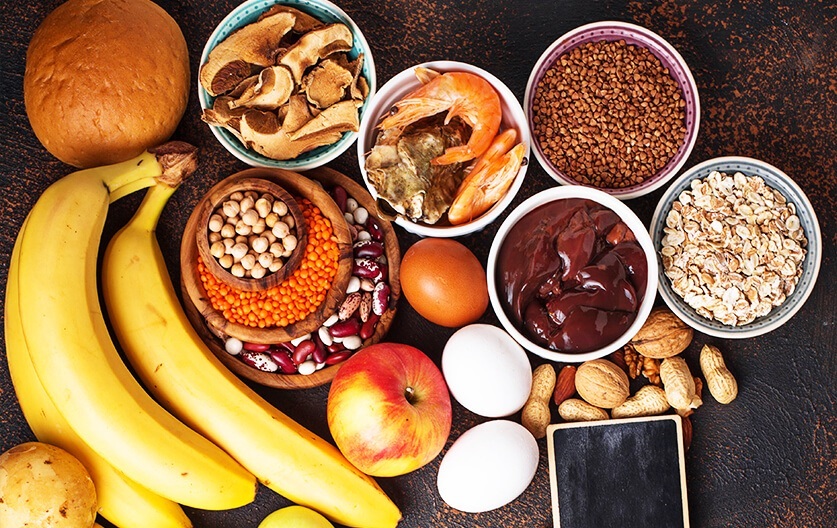- Home
- Mind & body
- Why iron is important
At CBHS we help you manage your health challenges. We believe in offering you the services, support and tools you need to live your best life.
Our Better Living Programs are available to support eligible members towards a healthier lifestyle. Each Better Living Program is subject to its own eligibility criteria.
Contact us for more information and to confirm your eligibility for a program.
Why iron is important

So you need to boost those iron levels, fast. Where do you start? First you’ll need to talk to a doctor, then you can start changing your diet.
Iron. Not just what burly people mine from the ground, but also a vital nutrient in the human body. It performs a number of important functions, most notably transporting oxygen in the blood. That’s why a deficiency in iron can cause symptoms like fatigue, decreased memory and decreased aerobic sports performance.
In this article we’re going to outline some quick ways to get iron back into your system, as well as discuss how to increase your iron absorption rate (which is the first step to increasing your levels).
However, before we proceed we must say that you should never self-diagnose iron deficiency. In too high doses, iron can be toxic. Please consult your doctor first if you’re worried about your levels - this is a general guide only.
How to increase iron absorption in your body
Sadly, iron isn’t magically absorbed into the body. Its absorption rate depends on your diet and the type of iron you’re consuming.
- Fast tip: There are two types of iron - haem and non-haem. The former is generally found in meat and is more efficiently absorbed into the body. The latter can be found in plant-based products and is absorbed less efficiently.
These are some common ways to increase your iron absorption rate:
- Add vitamin C to your diet: Vitamin C increases iron absorption, which makes it an ideal partner, especially for non-haem sources. “Pairing vitamin C with your meal gives non-haem iron a boost, upping its absorption,” nutritionist Cynthia Sass advised Everyday Health.
- Cut back on tea and coffee: Tannins from tea and coffee interfere with iron absorption and should not be consumed within a few hours (before or after) iron-rich meals. Avoid chocolate too, as some cocoa has the same effect.
- Space out iron intake: Sass went on to recommend Everyday Health readers to space out their iron intake, as the body can absorb more when consumed in several small doses instead of a single large one.
Ways to boost your iron levels
Adding the following foods into your regular diet can set you on your way to normalising your iron levels. To find out specifically how much you require each day, please consult your doctor.
Haem iron
Upward of 70 per cent of the iron found in meat products (outlined below) is haem iron, making these an effective source. The rest of the iron is non-haem.
We’ve ordered these ingredients from most iron to least, using Nutrition Australia's (NA) guidance:
- Organ meats (e.g. chicken liver)
- Red meat (e.g. beef and lamb)
- Salmon
- Pork
- Chicken
Although not included in NA’s chart, oysters are also considered a great source of iron. If we added them to the above list, they would come in second place (based on data from the US Department of Agriculture).
Non-haem iron
This type of iron isn’t as efficiently absorbed, but that doesn’t mean you should avoid it. You just won’t absorb as much iron per serving as, say, a beef steak. Vegans, vegetarians and other non-meat-eaters may need to consume more servings of the below to get their levels up, although you should only make this decision after consulting your doctor.
From most iron to least, using guidance from NA:
- Weetbix and All Bran - cereals like wheat, oats etc. are good non-haem sources
- Kidney beans
- Tofu
- Chickpeas
- Cooked wholemeal pasta
- Cashews
- Spinach
- Dried apricot
- Broccoli
- Cooked brown rice
- Wholegrain bread
Essentially, fortified cereals, dark-green leafy veg, beans and legumes, and dried fruits are all sources of non-haem iron.
What about supplements?
Iron supplements are available, in various forms (commonly pill, capsule or liquid). Due to their higher dosage and some of the potential side effects, you should only take iron supplements if you have been instructed to do so by a professional and given appropriate guidance.
And those are the basics! Iron levels can typically be brought back up to normal with a change in diet, even for those who avoid meat. You just have to consult a doctor first to ensure you are doing so safely.
Sources:
- https://www.ncbi.nlm.nih.gov/pmc/articles/PMC3999603/
- https://www.betterhealth.vic.gov.au/health/ConditionsAndTreatments/iron-deficiency-adults
- https://www.mayoclinic.org/diseases-conditions/iron-deficiency-anemia/symptoms-causes/syc-20355034
- https://www.ncbi.nlm.nih.gov/pmc/articles/PMC5793309/#B9-nutrients-10-00081
- http://www.nutritionaustralia.org/national/resource/iron
- https://www.healthline.com/nutrition/increase-iron-absorption#section1
- https://www.webmd.com/diet/iron-rich-foods#1
- https://medlineplus.gov/ency/article/007478.htm
Health and wellbeing
programs & support
You Belong to More with CBHS Hospital cover:
- Greater choice over your health options including who treats you
- Get care at home with Hospital Substitute Treatment program
- Free health and wellbeing programs to support your health challenges
Live your healthiest, happiest life with CBHS Extras cover:
- Benefits for proactive health checks e.g. bone density tests, eye screenings
- Keep up your care with telehealth and digital options
- Save on dental and optical with CBHS Choice Network providers
